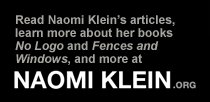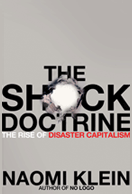The Shock Doctrine

No Logo Author Ready to Take Heat over Latest Opus
Pat Donnelly, Montreal Gazette, September 4, 2007
Book shock doctrine zaps capitalism. Links McGill brainwashing experiments with Guantanamo Bay and Abu Ghraib
Less than a week before the launch of her new book, The Shock Doctrine: The Rise of Disaster Capitalism, Naomi Klein was in a buoyant mood.
Yes, she anticipates fierce criticism, she said, speaking from her publisher's office in Toronto. But with seven researchers and four lawyers (one Canadian, two British and one American) backing her up, she feels battle-ready.
"For every potentially libelous claim that I made," she said, "I had to produce the original document for. They didn't take anything at my word. It was really a very rigorous process."
As she proved with her bestselling No Logo: Taking Aim at the Brand Bullies, in 2000, Klein is not one to pull punches. The Shock Doctrine blames Milton Friedman's "Chicago School" of economists for harming many nations they set out to help.
The sharp impact of her title is amplified by a re-examination of the brainwashing experiments of Ewen Cameron at McGill University in the 1950s, connecting them to Guantanamo Bay and Abu Ghraib.
Later she weaves in Pinochet's Chile, Yeltsin's Russia, tsunami-hit Sri Lanka, hurricane-swept New Orleans and post-communist Poland, plus other countries she claims were subjected to the "shock treatment" of radical capitalism.
"It's a book of recent history," Klein said. "It names names. And it is a story that is radically different from the one that has been told up until now. So there's a lot at stake in terms of people's reputations, in terms of the way they want to go down in history."
One person frequently mentioned in the book, economist Jeffrey Sachs, bowed out of a scheduled debate with Klein at the American Sociological Association in New York last month - filing his comments by DVD instead.
Why didn't he show up? "I have no idea," replied Klein, "I take Jeffrey Sachs at his word - that he had a scheduling conflict. But I also happen to know that Jeffrey Sachs has read the book. Someone leaked it to him. And I know he's very upset."
A pause, then a sweetly delivered inquiry. "Have my lawyers taught me well?"
So much for her adversaries. What about Klein's friends? Now that she's 37, no longer the wunderkind who ripped into hyper-branded world of Nike and Starbucks, aren't they expecting another tablet from Moses? Isn't that why The Shock Doctrine is being simultaneously released in seven languages (No Logo was eventually published in 28.) There's also a related short film, which Klein co-wrote, about to be released at the Toronto International Film Festival.
"My friends never thought I was handing them tablets," she replied. "Most activists I know are just looking for fresh ammo, fresh framings and good research that they can rely on, to make the case - that they're already making, in the streets. But they need backup, they need fresh fuel."
Few can pump out high-octane prose like this graduate of St. George's High School in Westmount can.
She may have dropped out of university but, as she points out, to many students No Logo is now homework.
One personal reason for writing The Shock Doctrine: "I really felt that our analysis hadn't kept pace with the 9/11 world."
In the spring of 2004, Harper's Magazine asked Klein to do a story about what had gone wrong in Iraq.
"It was really the beginning of the thesis of the book," she said, ''the way in which disasters, whether deliberately created or not, were exploited to impose these radical free market policies that would be rejected under other circumstances. And, of course, in Iraq, that was obvious for everyone to see."
Then, the Asian tsunami hit and she wrote a cover story for The Nation titled The Rise of Disaster Capitalism. That story was the kernel that grew into a 662-page magnum opus. Knopf Canada provided an advance for the book, but Klein got so carried away that she missed her one-year deadline.
"It was quite annoying actually when I kept finding out that I had to add another chapter," she recalled.
It took her 21/2 years to complete the final draft.
Indispensible to the process was her spouse, CBC broadcaster Avi Lewis: "He's been an amazing partner," she said. "We talk all the time. We really help each other figure things out. I can't really describe the extent to which he's contributed to this."
Klein, a Montreal-born dual Canadian/U.S. citizen, doesn't consider herself a rebel. She was born into social activism (her mother NFB filmmaker Bonnie Klein and her father, a doctor, fled to Canada from the U.S. at the time of the Vietnam War). And she married into it, too. (Her in-laws are former Ontario New Democratic Party leader Stephen Lewis and journalist Michelle Landsberg.)
"This is a tradition. We're part of a tradition, and it's a tradition that doesn't get talked about as as tradition very often. But I'm proud to be part of it."
Naomi Klein speaks tomorrow at Concordia University's Hall Building, 1455 de Maisonneuve Blvd. W. at 7:30 p.m. Admission $6 or $4 for students.
Book shock doctrine zaps capitalism. Links McGill brainwashing experiments with Guantanamo Bay and Abu Ghraib
Less than a week before the launch of her new book, The Shock Doctrine: The Rise of Disaster Capitalism, Naomi Klein was in a buoyant mood.
Yes, she anticipates fierce criticism, she said, speaking from her publisher's office in Toronto. But with seven researchers and four lawyers (one Canadian, two British and one American) backing her up, she feels battle-ready.
"For every potentially libelous claim that I made," she said, "I had to produce the original document for. They didn't take anything at my word. It was really a very rigorous process."
As she proved with her bestselling No Logo: Taking Aim at the Brand Bullies, in 2000, Klein is not one to pull punches. The Shock Doctrine blames Milton Friedman's "Chicago School" of economists for harming many nations they set out to help.
The sharp impact of her title is amplified by a re-examination of the brainwashing experiments of Ewen Cameron at McGill University in the 1950s, connecting them to Guantanamo Bay and Abu Ghraib.
Later she weaves in Pinochet's Chile, Yeltsin's Russia, tsunami-hit Sri Lanka, hurricane-swept New Orleans and post-communist Poland, plus other countries she claims were subjected to the "shock treatment" of radical capitalism.
"It's a book of recent history," Klein said. "It names names. And it is a story that is radically different from the one that has been told up until now. So there's a lot at stake in terms of people's reputations, in terms of the way they want to go down in history."
One person frequently mentioned in the book, economist Jeffrey Sachs, bowed out of a scheduled debate with Klein at the American Sociological Association in New York last month - filing his comments by DVD instead.
Why didn't he show up? "I have no idea," replied Klein, "I take Jeffrey Sachs at his word - that he had a scheduling conflict. But I also happen to know that Jeffrey Sachs has read the book. Someone leaked it to him. And I know he's very upset."
A pause, then a sweetly delivered inquiry. "Have my lawyers taught me well?"
So much for her adversaries. What about Klein's friends? Now that she's 37, no longer the wunderkind who ripped into hyper-branded world of Nike and Starbucks, aren't they expecting another tablet from Moses? Isn't that why The Shock Doctrine is being simultaneously released in seven languages (No Logo was eventually published in 28.) There's also a related short film, which Klein co-wrote, about to be released at the Toronto International Film Festival.
"My friends never thought I was handing them tablets," she replied. "Most activists I know are just looking for fresh ammo, fresh framings and good research that they can rely on, to make the case - that they're already making, in the streets. But they need backup, they need fresh fuel."
Few can pump out high-octane prose like this graduate of St. George's High School in Westmount can.
She may have dropped out of university but, as she points out, to many students No Logo is now homework.
One personal reason for writing The Shock Doctrine: "I really felt that our analysis hadn't kept pace with the 9/11 world."
In the spring of 2004, Harper's Magazine asked Klein to do a story about what had gone wrong in Iraq.
"It was really the beginning of the thesis of the book," she said, ''the way in which disasters, whether deliberately created or not, were exploited to impose these radical free market policies that would be rejected under other circumstances. And, of course, in Iraq, that was obvious for everyone to see."
Then, the Asian tsunami hit and she wrote a cover story for The Nation titled The Rise of Disaster Capitalism. That story was the kernel that grew into a 662-page magnum opus. Knopf Canada provided an advance for the book, but Klein got so carried away that she missed her one-year deadline.
"It was quite annoying actually when I kept finding out that I had to add another chapter," she recalled.
It took her 21/2 years to complete the final draft.
Indispensible to the process was her spouse, CBC broadcaster Avi Lewis: "He's been an amazing partner," she said. "We talk all the time. We really help each other figure things out. I can't really describe the extent to which he's contributed to this."
Klein, a Montreal-born dual Canadian/U.S. citizen, doesn't consider herself a rebel. She was born into social activism (her mother NFB filmmaker Bonnie Klein and her father, a doctor, fled to Canada from the U.S. at the time of the Vietnam War). And she married into it, too. (Her in-laws are former Ontario New Democratic Party leader Stephen Lewis and journalist Michelle Landsberg.)
"This is a tradition. We're part of a tradition, and it's a tradition that doesn't get talked about as as tradition very often. But I'm proud to be part of it."
Naomi Klein speaks tomorrow at Concordia University's Hall Building, 1455 de Maisonneuve Blvd. W. at 7:30 p.m. Admission $6 or $4 for students.






















